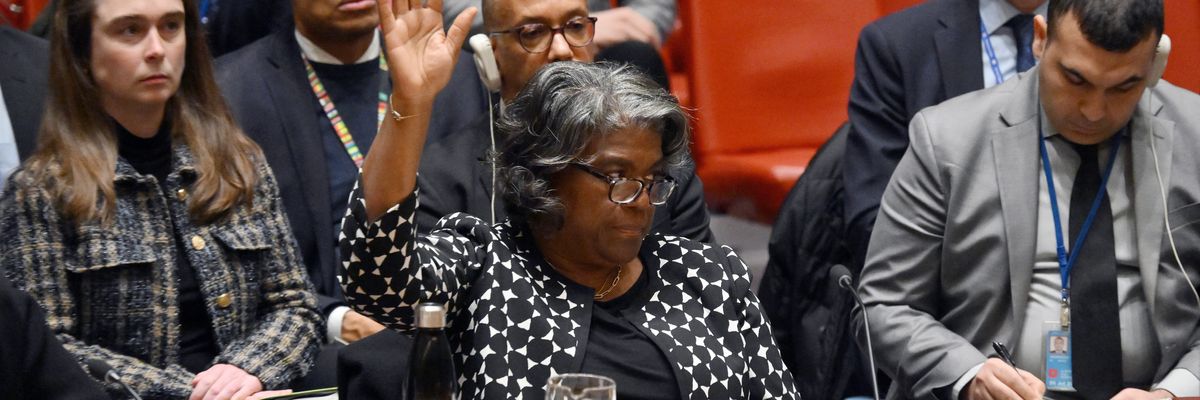As the United Nations Security Council prepares to vote Thursday on Palestine's bid to become a full U.N. member, the Biden administration—which claims to support Palestinian statehood—is lobbying UNSC nations in an effort to wrangle enough "no" votes so that the United States can avoid resorting to a veto.
Leaked cables obtained by The Intercept show U.S. pressure on Security Council members including Malta—which currently presides over the body—and Ecuador.
While claiming that President Joe Biden backs "Palestinian aspirations for statehood," one of the cables asserts that "it remains the U.S. view that the most expeditious path toward a political horizon for the Palestinian people is in the context of a normalization agreement between Israel and its neighbors."
"We therefore urge you not to support any potential Security Council resolution recommending the admission of 'Palestine' as a U.N. member state, should such a resolution be presented to the Security Council for a decision in the coming days and weeks," the document advises.
The U.S. argument essentially is that the U.N. should not create an independent Palestinian state by fiat—even though that's precisely how the world body voted in 1947 to establish the modern state of Israel.
The renewed push for Palestine's U.N. membership comes as Israel wages a genocidal war on the Gaza Strip. The Palestinian Authority, which hasn't controlled Gaza for nearly two decades, rejected the Biden administration's requests to hold off on seeking full membership.
"We wanted the U.S. to provide a substantive alternative to U.N. recognition. They didn't," one unnamed Palestinian official toldAxios on Wednesday. "We believe full membership in the U.N. for Palestine is way overdue. We have waited more than 12 years since our initial request."
As The Intercept's Ken Klippenstein and Daniel Boguslaw noted:
Since 2011, the U.N. Security Council has rejected the Palestinian Authority's request for full member status. On April 2, the Palestinian Observer Mission to the U.N. requested that the council once again take up consideration of its membership application. According to the first State Department cable, U.N. meetings since the beginning of April suggest that Algeria, China, Guyana, Mozambique, Russia, Slovenia, Sierra Leone, and Malta support granting Palestine full membership to the U.N. It also says that France, Japan, and Korea are undecided, while the United Kingdom will likely abstain from a vote.
Along with the United States, China, France, Russia, and the United Kingdom are permanent members of the UNSC, so they also have veto power.
Ahead of Thursday's planned vote, Spain has been doing its own lobbying in Europe to build greater support for Palestinian statehood. At a joint Tuesday press conference with Spanish Prime Minister Pedro Sánchez, Slovenian Prime Minister Robert Golob said the question is "when, not if, but when is the best moment to recognize Palestine."
Belgium—which is seeking economic sanctions against Israel in response to its genocidal war on Gaza—is expected to join Spain's push for Palestinian statehood after the country's European Union presidency expires in June.
Currently, 139 of the U.N.'s 193 member states recognize Palestine as an independent state.
Israeli Prime Minister Benjamin Netanyahu—who has also claimed to support a so-called "two-state solution"—has alternately boasted about thwarting Palestinian statehood.
Critics pointed to the leaked cables as more proof of U.S. duplicity and double standards on the Israel-Palestine issue.
"This is the evidence that President Biden's talk about a two-state solution is nothing but idle talk," Massoud Maalouf, a former Lebanese ambassador to Canada, Chile, and Poland, said on social media.

